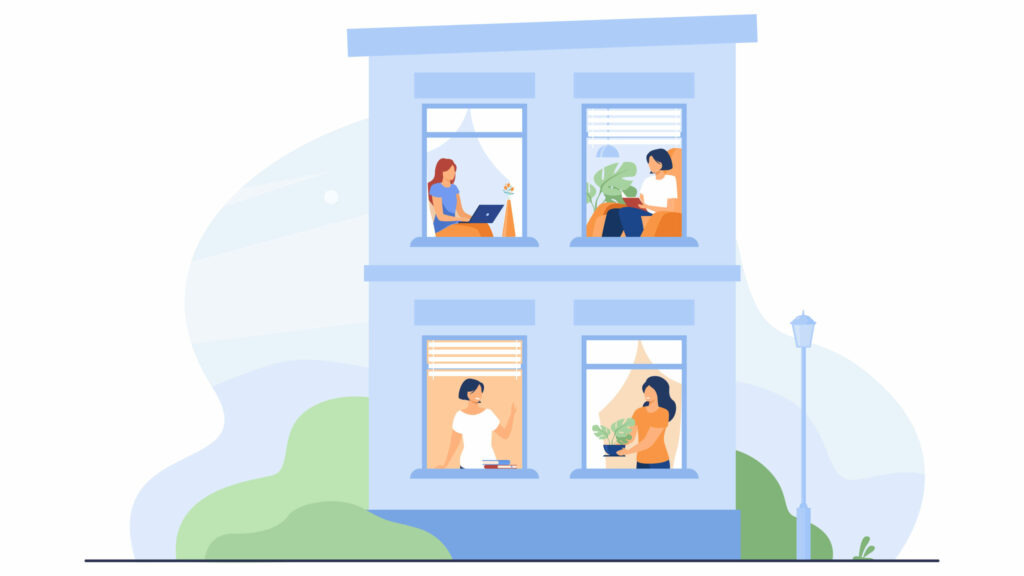Student housing
Finding student housing in the Netherlands can be quite challenging. The Netherlands is a popular study destination for international students since the universities in our country rank high and offer many courses in the English language. As a result, the demand for student housing is very high. Especially in major Dutch cities with universities such as Amsterdam, Utrecht, Rotterdam, The Hague, Leiden, Nijmegen or Groningen.
In the Netherlands, it is common for students to live off-campus in student houses throughout the city and in surrounding areas. Although several universities and educational institutions have on-campus housing or room arrangements, finding accommodation usually is the student’s responsibility. As mentioned before, finding a room or apartment that fits your needs and is affordable at the same time isn’t easy. Therefore, it is important to start looking for housing as early as possible!
Different types of Dutch student housing
There are many types of student housing in the Netherlands, such as student apartments, student houses and university housing. Depending on your budget and preferences, you can go for one of these options.
Student apartments
Student apartments or flats provide you with your own private bedroom. Other facilities, such as toilets, bathrooms, the kitchen and living room are shared with other students. Student flats can host up to 12 people. In student flats usually, a mixture of men and women live under the same roof. Furthermore, the rooms might be small, and it is important to check whether the room is already furnished or not. Furnished rooms can contain a bed, closet, desk and chair, for example. If the room is not furnished yet, visiting second-hand shops and buying your furniture there may help save you a lot of money.
Student houses
Most students in the Netherlands look for a room in a student house. Such student houses are usually privately-owned and offer space for up to six people. It can be a great experience to meet and live with other students, although it is important that everybody respects the house rules. In student houses, you also share communal spaces such as the living room, kitchen and bathroom.
University accommodation
Many universities in the Netherlands offer university accommodation, such as student houses or apartments, via their housing offices or collaborations with housing organisations. Some universities might also be able to offer temporary housing for international students. Finding housing through your university is a great opportunity to meet other students and work on expanding your social circle.

Where can I find student housing in the Netherlands?
As mentioned before, there is a very high demand for student housing in the Netherlands. Therefore, it’s best to start looking for accommodation as quickly as possible. The organisations and websites below can help you find student housing.
Contact your university for university housing
If your university or educational institution offers housing through their own offices or several housing organisations, you can register for a room as early as possible. The rent will depend on the city and the type of accommodation you want to rent.
Rental housing agency
These agencies can help you, based on your preferences, to find a space to live in your student city. Look for an agency in your city. Please be aware that many of these agencies charge fees for their services.
Student housing corporations
Student housing corporations, such as SSH Student Housing or DUWO, help students find housing. As soon as you register, you’ll be added to a waiting list since there is a shortage of living spaces. Students that have been registered the longest will be able to do viewings. This can’t be done from your home country, booking in advance, unfortunately, is not possible.
Student societies and associations
Student societies and associations, also called ‘studentenverenigingen’, can sometimes offer you student housing through membership. Apart from expanding your social circle, you’ll be able to meet new people, enjoy events organized by the association and possibly rent a room in one of their privately-owned student houses.
Use internet and social media
Through the internet you can start your search for a room at an early stage. On social media, you can share your search so that people in your network who might know someone that looks for a roommate can contact you. You can find a list of handy websites below:
- Clawq
- Funda
- Houselink
- Kamer gezocht/aangeboden (Facebook group)
- Kamernet
- Nestpick (furnished apartments)
- Only Expats
- Pararius
- Roomplaza
- Smart Wonen
- Uniplaces
Short stay of temporary accommodation
Temporary accommodation might be necessary if you still need to find a space to live in or because you have to wait a couple of weeks before you can enter your new room. If you’re here for a short stay, you might want to look into hotels such as The Social Hub. These places come fully furnished, have communal spaces and offer free Wi-Fi.
Another option is looking for short-term rental apartments, which often offer more privacy, comfort and lower prices compared to a hotel. This can be a great solution for students that want to get to know their city first or for friends and family that are visiting.

Accommodation costs in the Netherlands
If you’re considering studying in the Netherlands you’ll need to know the average rent for a student. The rent can be very different in each major Dutch city, although students usually pay between €300,- and €600,- a month. Make sure to check what (service) costs are included in the rent. We’ll give you an overview of the average rent for different accommodation types.
- Student houses (between €300,- and €600,- a month)
- Shared apartment (between €400,- and €700,- a month)
- Single apartment or studio (between €500,- and €1.000,- month)
Apart from the rent, you’ll have other costs of living and tuition fees to pay. Make sure to check if you qualify for a housing allowance. For more information you can read more on our page regarding student finance.
Municipal taxes
International students that rent a living space must pay, just like everyone else who lives in the Netherlands, the following municipal taxes:
- Waste collection charge or levy (afvalstoffenheffing): normally this charge is not included in your monthly rent. You will receive a separate bill as a resident of the house. If you live in a shared home, the bill goes to the main user. This normally is the tenant who registered first on that address (or the one who is the oldest). He or she is responsible for the payment, although tenants can organize among themselves to share the costs of the bill. In this case, you pay the multi-person rate.
- Sewage levy: this levy is paid for the connection of your house to the sewage network of your city. Check your rental contract or ask your landlord if this levy is included in your rent. Normally the sewage levy is charged separately, just like the waste collection charge.
Housing rights in the Netherlands
Once you’ve found a place to live, the next step is to formalize the agreement by signing the rental contract. In general, a rental contract needs to contain:
- The names and signatures of both parties, you and your landlord;
- Beginning and end date of the rental period and prolongation possibilities;
- The address and description of the rented space;
- Deposit and the amount of monthly rent, including the method of payment
- All included (or excluded) services and utilities, such as water, electricity and internet;
- Cancellation possibilities and notice period;
- Duties for repair and maintenance (for the landlord);
- House rules (regarding having pets, smoking etc);
- If the apartment or room is furnished: an inventory list.
The rental agreement usually is a written agreement that you keep for security reasons. Although oral rental agreements are legal, they are not very common since you have no proof unless you bring a witness. For that reason, also because four eyes see more than just two, we recommend you to take another person to a viewing. Lastly, don’t sign a rental contract without reviewing it carefully. And make sure not to pay anything, such as the deposit, before signing the final rental contract.
Type of rental contract
There are two types of rental contracts: indefinite or fixed-term contracts. In case you’ve signed an indefinite contract, there is no end date stated in the rental contract. That means you can terminate the contract whenever you want (taking into account notice periods). The contract can only be terminated by your landlord if there are valid legal reasons, through court or mutual agreement.
If you have signed a fixed-term contract, there is an end date in the contract. However, normally these end dates include the possibility of prolonging the contract if desired. That means that the fixed term really can be considered as a minimal rental period if not stated otherwise. You cannot move out before the end date unless your landlord agrees to an early leave.
Your housing rights (and duties)
Both the landlord and tenant have obligations and duties with regard to the rental contract. The landlord must ensure his property is fully available for the tenant in the agreed rental period. Furthermore, any necessary major repairs and maintenance fall under the landlord’s responsibility. That also includes problems with electricity or internet (if offered by the landlord).
In return, you’re responsible for timely payment of the rent. Furthermore, you’ll have to pay for minor repairs in the house and respect the applicable house rules. All defaults discovered in the house have to be reported to the landlord. In case it is necessary for the landlord to enter your home with the purpose of reparation, access needs to be granted. For a complete overview of your housing rights, you can read the tenants’ rights manual of the Dutch Student Union.
In case of a disagreement, first of all, it is important to talk to and file your complaint with your landlord. If you don’t find a solution together, you can take your complaint to the complaints committee of the housing corporation. Or contact the Housing Hotline of the Dutch Student Union. Another option is to file a complaint with the Huurcommissie (Rent Tribunal).
Home insurance
When you move to your new home it is important to take out home insurance (contents insurance). Home insurance covers costs of damage to your personal belongings due to for example water, fire or theft. To protect your valuable belongings, such as musical instruments, laptops, tablets, smartphones, clothes and furniture, it’s worth comparing different home insurances. Especially since student homes are interesting for burglars due to their (often) poor security. If you also want to protect your portable valuable belongings outside your home, you can consider mobile/outdoor insurance.
You can read more on our Student insurance page.




